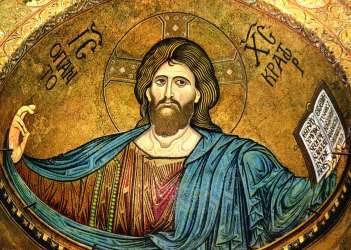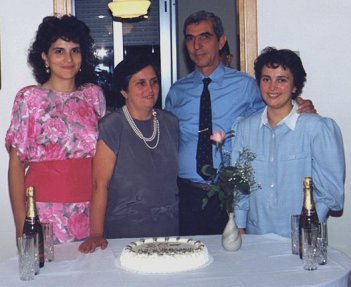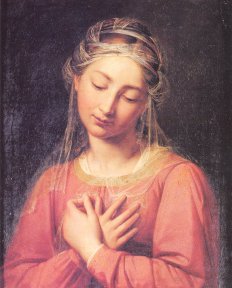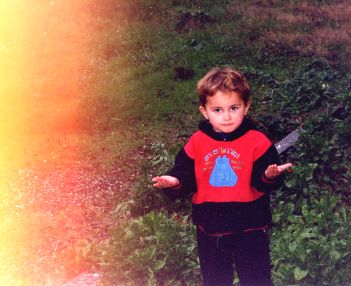
Santa Scorese:
an intense life devoted to God
through Our Lady
Egidio Ridolfo s.j.
[Translated by Antonella Nappo]
 |
Santa Scorese: Egidio Ridolfo s.j. |
![]() A passionate pursuit
A passionate pursuit
Santa Scorese was no different from any other girl. She was engaged in some catholic movements, but she was extraordinarily eager to seek after the "Truth", the truth about "reasons of our faith" but also the truth about "herself". Her pursuit became more intense when she understood the intentions of God and her "vocation".
This perception dismayed her and attracted her at the same time. Many Saints and people have had the same experience. The revelation of God in their souls has provoked the same conflicting feelings.
 |
with Christ’s love... [Pantokrator Christ - Monreale Cathedral, Palermo] |
She fought an "inner struggle" by alternating serenity and sweetness with lack of feeling and desolation. Her struggle was full of questions, graduated achievements and awareness leading to the joy and the increasing gratitude to God who loves his creatures without reservations. She had a spontaneous enthusiasm exactly as we read in the Magnificat of Our Lady: "God Almighty has done many great things in myself… hallowed be His Name!"
Santa Scorese wrote on December 30th, 1988: "Oh my God, I am in front of You, your power and your boundless love. Thank you! [...]
You called me and I answered; now I can see all great things You have done and You still do every day in myself. Little by little You are reaching the bottom of my heart and my soul looks for You every time it needs to revive. [...]
Please, teach me to love, to be a kind-hearted person for You and all the world.
Let me sing my Magnificat reminding everything You have done in myself and allow me to walk with Our Lady along the way leading to the endless life!" (1).
When God - who "suggests" and takes the initiative (this is the meaning of "vocation") - finds a sincere availability in our souls he comes towards us. So, we join Him more and more intimately. The Holy Writ tells about the Wisdom that "is easily admired by its lovers and found by those people who wish to seek it." And it adds that they who long for wisdom "will find it on their threshold "! (Sap. 6, 12-14).
As Santa Scorese wrote so many times in her Diary and in her beautiful poetry-prayer "Vorrei avere le ali di un'aquila..." (2), little by little God showed her wider horizons and she let herself go completely making little and great concrete choices day by day. She was longing to involve most people in her Love for Christ.
On the other hand, Love wants to spread and communicate: this is the reason of the creation of the world. Jesus – as a great "Artist of souls" - providentially favoured her human and spiritual maturity through people and movements. They gave her great spurs and she was involved in many concrete initiatives inspired by Christian charity and desire for evangelisation.
![]() Spiritual influences
Spiritual influences
Dalle pagine del Diario emerge chiaramente il forte e positivo influsso esercitato su Santa Scorese dal movimento dei Focolari di Chiara Lubich e poi soprattutto dalle "Missionarie dell'Immacolata - Padre Kolbe", delle quali faceva parte (come ne fa parte attualmente) Carmencita Picaro, autrice della biografia di Santa, biografia tanto più credibile in quanto una grande amicizia le legava.
 |
As regards the influence of Chiara Lubich movement, you have only to observe that Chiara’s name is often found in the Diary, together with many typical terms of her Focolari movement. There are expressions and "key-words" - often abbreviated in accordance with the usages of the movement – such as: "Gesù in mezzo" (Jesus among us) (G.I.M.), "Ideal", "Gesù abbandonato" [Jesus forsaken] (G.A.), "unity" and many others.
These are two examples: "I saw the sorrow of my neighbours and I shared it with them, exactly as Chiara said…" (March 11th, 1987).
"Chiara is sure that when we are wrong it is not use crying: we have to begin loving again. […] This is a period full of pains and anxieties; sometimes I feel forsaken but I try as much as possible to recognize G.A. [Jesus forsaken] and to love him unconditionally even if this is a little bit hard." (June 2nd, 1987).
"Gens" (New Generation) are very important groups of Focolari movement: they turn their attention to the youth. Santa Scorese frequented the Gen group of her town and joined the musical group "Gen 2" thanks to her vocal talent. On July 15th, 1987, she wrote:
"I trust in Gen’s unity: it is very important to believe in G.I.M. [Jesus among us] To tell the truth I cannot wait to see them so it will be possible to restore that greatest unity among us."
Also the movement of "Missionaries of Immaculate-Father Kolbe" exerted a very important influence on spiritual life of Santa Scorese. P.Luigi Faccenda founded the group and the influence of the movement became more and more intense in time. Many times Santa left Palo del Colle, near Bari, to go on retreat in the central seat of Missionaries, in Borgonuovo di Pontecchio Marconi, not far from Bologna.
The strong Marian spirituality, common to both movements, pervaded her way. Santa came under St. Massimiliano Maria Kolbe’s spell. The great Saint inspired "Missionaries of Immaculate": the Blessed Virgin gave him both the virginal consecration and the trial of the martyrdom (we refer to a famous episode of Kolbe’s life).
Charity guided his martyrdom: it was a light of the Sky in the bleakness of the extermination camps such as Auschwitz where Father Kolbe offered his life instead of an unfortunate father of a family. He expected the terrible consequences but he was sure to have the strength to testify his Faith in God and exert his charity to the very last.
So Father Kolbe wrote about the role and purpose of Mary towards us: "The Immaculate wants to extend the fruits of His Son’s redemption to all mankind. [...] Her only desire is to raise our spiritual life to the peaks of sanctity" (3).
God loves to show Himself as a Lord of Life even – and particularly – in more desolated and horrible situations. Kolbe offered his life in 1941, and the year after, on August 9th, 1942, God worked another great miracle through the beautiful person of Edith Stein. John Paul II defined her as "Hebrew, philosopher, Carmelite, martyr", and recently she has been canonized.
 |
![]() Progressive availability as a means of God
Progressive availability as a means of God
As already mentioned, God favoured Santa Scorese’s insight through P.Luigi Faccenda, her affectionate father confessor, and many "Missionaries of Immaculate – Father Kolbe". Particularly, Santa considered Carmencita Picaro a great gift of the Sky. They were on the same spiritual wavelength and Carmencita very often incited her to be calm and go on saying "Yes" to God.
Many times Santa thanked God for that friendship. She opened her heart to Carmencita especially when she passed through a crisis but also when she felt the joy of discovering how great was Mary and God’s love for her.
Santa Scorese certainly met with God thanks to the priests, who guided her spiritually, and Carmencita Picaro. She identified herself with Mary and emulated her availability: "Here I am, the servant of God, Thy will be done" (Lc 1, 38).
Even so Santa had all typical limits and weaknesses of modern youth: disorientation, mass-media’s influence, its "false and deceiving" models, based on the external appearances, often causing foolish fervours and consequent depressions, the difficulty to act with great firmness, to take radical decisions- even if youth are radical – the hard relations among them and so on…
Carmencita Picaro wrote Santa’s biography after her tragic death, her martyrdom to defend her own dignity as a woman and Christian. The influence of Carmencita on Santa’s human and spiritual maturity appears very clear in her Diary. Let see an example: it was February 6th, 1988:
"I had a talk with Carmencita after lunch. I completed what I started to say to the father. When we talk I always feel a very deep community of souls and it is very clear we love and help each other. Our mutual interest is God: He is our only aim and we want to join Him."
 |
(Santa Scorese: March 21st, 1988) Photo: Ernesto Santucci s.j. |
The "little-great" Sainte Theresa of Lisieux (1873-1897) said that God was her true "Spiritual Director", as well as Santa Scorese. She met Jesus-Eucharist, and fed on the Word of God revealed in the Holy Writ.
In fact, as Prof. Giuseppe Micunco, her editor, has pointed out, every page of her Diary contains many quotations - direct or indirect - to precise passages of the Holy Writ, both New and Old Testament. There are many constant and spontaneous references, in confirmation of her familiarity with the Holy Book. God revealed Himself through the Text as a Father, Love, Redeemer and Friend.
This familiarity with the Word of God is a very important element proving the intensity of her Christian life and it reminds us of the famous pages of the "History of a soul" [Storia di un'anima] written by Theresa of Lisieux. The strength of God’s Word and an open-minded temperament work together in Santa Scorese to testify her Christian life, in every moment, even if she knew many people criticized her.
Santa Scorese’s writings, the Diary, the "poetries-prayers", permit a deep knowledge of her human and spiritual life, so we totally agree with Father Vito Bitetto, the Postulator of Santa’s Cause of Beatification when he ends his announcement about the opening of the canonical process in Rome after the closing of the diocesan phase.
He wishes God, allowing the proclamation of Santa as a Blessed, could light and help "those people who wish to progress in their own inner and ecclesial life. He refers both to the consecrated people, priests, and lay believers, especially to young and educators, who will see this girl as an extraordinary and enchanting model of consecration to the Love of God. We hope that the life of Santa, sacrificed for God’s love, could be a germ of a new sanctity" (4).
![]() The martyrdom, the ending of an intense spiritual life.
The martyrdom, the ending of an intense spiritual life.
So many times the horrible murder of Santa Scorese has been compared with Sainte Mary Goretti’s death: the "flower of Pontine Marshes". This year is the centenary of Mary Goretti’s martyrdom: July 6th, 1902-2002. Many people have called the attention to her figure, often underestimated or belittled wrongly even through unfortunate phrases such as "Sainte for five minutes..."
We know things are very different. Maria Goretti’s martyrdom was just the supreme deed of a life totally devoted to God though she was very young: she trusted in Him and in the Blessed Virgin.
However familiar, cultural and religious contexts are dissimilar and so many years have passed, we can assert Santa Scorese’s martyrdom, that is to say the violent aggression on March 15th, 1991 has been the last deed of a young life already devoted to God and Mary.
Saint Theresa of Lisieux wrote: "Aimer c'est tout donner et se donner soi-même": "Loving is to give everything and to give oneself". This is possible and it is a spontaneous gesture of the soul when we understand how great is the love of God for us.
"I know God is really the only unshakeable certainty in our life. I feel His presence give us serenity and confidence in spite of our confusion. I am sure I am not alone, He loves me, for all my faults, and I feel I must choose Him every day because He is the most important thing for me, and it is well worth fighting, suffering and dying." |
Santa Scorese understood these things through an inner struggle, in a crescendo of astonishment and gratitude. She felt the ups and downs of life and the fits of enthusiasm: they were her spontaneous answer – as a little creature – to God. She also applied to the Immaculate, asking the strength to overcome her "human limits", to persuade her parents to let her go, what kind of university studies to begin and so on... She was full of anxiety and maybe she felt to get very little time...
She asked God – and obtained – the strength to go on when she perceived that a young man - who just wanted to press his attention on her - was watching even the slightest movements of her life. She was considered a prey to catch and her short existence finished with the violent aggression on March 15th, 1991...
Unfortunately, this kind of events are very frequent, so Santa Scorese is the redemption for the dignity of many women offended every day. Dignity of creatures and daughters of God based on the awareness to be created in "God’s own image and likeness", exactly as each human being. So, we hope Santa could be blessed very soon.
This is the meaning of Carmencita Picaro’s phrase at the end of the chapter describing the Santa’s aggression on March 15th, 1991:
"The little book of Santa’s life finished with this last page. She was a girl no different from any others: her body was offended by the wounds of an unquiet and suffering society, greedy for material things not for life, for sex not for love, for pleasures not for God!" (5)
![]() Light of Hope
Light of Hope
The Faith opens to Hope which is based on the Resurrection of Jesus our Redeemer but also our great Friend. Santa Scorese has achieved the height of her life so desired and firmly pursued during her earthly pilgrimage. Now she is in the Sky, with God and the Immaculate forever. She can show her Charity towards us even more generously. In fact, as Church considers Santa a "Servant of God", we can invoke her to have some help for our temporal and spiritual needs.
Even if Santa Scorese’s life experienced, as we know, many hard times, we already see God is working miracles in so many souls through her. Many people fight to seek after truth and God is increasing the value of what she wrote in her Diary both when she was passing through a crisis and when she was very happy to be loved by Him.
There is a deep-rooted phrase in her Diary dated February 21st, 1990, a year before her death. We thank Santa for these words:
"I know God is writing my story and, against my will, he will be able to complete His work. Now, I know even in the sorrow and dark I can sing my "Magnificat" for Him and Mary to thank for all things He did and He still does for me.
I know I have understood the greatness and almightiness of God thanks to the Immaculate!"
Notes:
1. "L'attirerò a me", Scritti spirituali di Santa Scorese, Serva di Dio, edited by Prof.Giuseppe Micunco, San Martino Editions and Stilo Publisher, Bari, 2000, pp.144-145.
2. "Vorrei avere le ali di un'aquila", written by Santa Scorese on August 3rd, 1989 and readable (in italian) on this site. Text derived from the biography of Santa Scorese written by Carmencita Picaro: "Anche sul mare volano le aquile", Missionaries of Immaculate - Father Kolbe Editions, Bologna 1999, pp.41-42.
3. "Anche sul mare volano le aquile", Op.cit., p.62.
4. "L'attirerò a me", Op.cit., pag.8.
5. "Anche sul mare volano le aquile", Op.cit., p.13.
 |
||
"Orizzonti dello Spirito" | ||